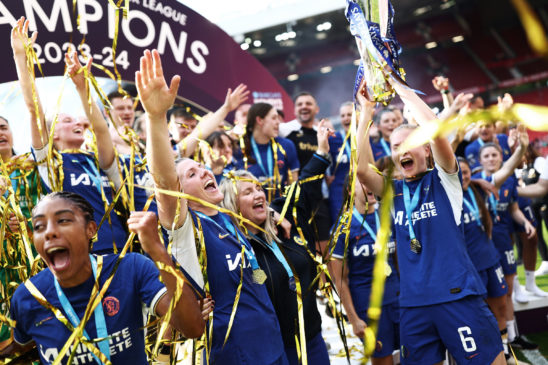Emma Hayes is buzzing. Hayes, the new British coach of the United States Women’s National Soccer Team (USWNT), who will make her debut coaching the U.S. squad in international competition at the Paris Olympics, has just watched her home country knock off the Netherlands in a thrilling Euro 2024 semifinal on July 10. “I’m absolutely over the moon,” Hayes tells TIME from a hotel in New Jersey, where her U.S. team is camped out while training for the Olympics.
But lest anyone be concerned that the mind of the coach of the most-dissected, honored, revered, and reviled American team in international sports is wandering too far afield, toward home—where Hayes grew up playing football in the streets of London and until May of this year was the wildly successful coach at Chelsea FC, one of the world’s premier club teams, and where the monarchy has appointed an Officer of the Most Excellent Order of the British Empire (OBE), a few notches below knighthood—Hayes focuses on her task at hand: restoring glory to America.
“I’ve always felt my best here,” says Hayes, who has coached both college and professional teams in the United States. “You have to be ready for this job,” she adds. “Experiencing the things I have has prepared me for it. I am so privileged that I’ve been picked to do this job. And yeah, I’m loving it. I’m absolutely loving it.”
Read More: What Are Olympic Medals Made Of?
That feeling will be more than mutual for the American soccer masses if, on Aug. 10, the U.S. women win the Olympic gold-medal match at the Parc des Princes. (The team opens up Olympic pool play on July 25 against Zambia in Nice.) Stakes are high for the USWNT, which hasn’t won an Olympic gold since 2012, in London. Not that long ago, in 2019, the USWNT was on top of the world in France, at the World Cup; the team won a second-straight world title in dominant fashion, and members of the fan group the American Outlaws chanted, “Equal pay! Equal pay!” rallying a fight for equality that was ultimately successful.
But the last two major global showings, under former coach Vlatko Andonovski, have disappointed. A bronze medal at the Tokyo Games three years ago, and round-of-16 loss at last year’s World Cup, the team’s earliest-ever exit from the tournament, cost Andonovski his job. So Hayes, one of the most-respected soccer coaches on the globe, was hired to correct the course.
She got the U.S. job last November but didn’t lead her first national-team training camp until this May, after the conclusion of her season with Chelsea. The U.S. beat South Korea in a pair of early June exhibitions and also won a friendly against Mexico on July 13, before playing to a scoreless draw with Costa Rica on July 16. Hayes made her presence felt around the globe in June, when she shocked many U.S. supporters by leaving veteran superstar Alex Morgan, the leading active goal-scorer in American history, off the Olympic roster.
“Alex has been an absolutely crucial player for this team over the years,” says Hayes. “Leaving her out was an incredibly tough decision.” But with the smaller Olympic roster—just 18 players, as opposed to 23 in the World Cup—and quick turnarounds between games, Hayes put a premium on players she could plug into multiple positions. “Versatility within the squad was a key part of that decision,” says Hayes. “It’s not about Alex. It’s about what the needs of the team were. And that was the heart of my thinking.”
She says she’s learned over the years to ignore reactions to high-profile decisions. “I’ve got a job to do,” says Hayes. “My job is everybody’s hobby. So everybody’s entitled to an opinion, but at the end of the day, I’m the person who is charged with the responsibility of leading this team. And if I’m going to do that to the best of my ability, then I have to know how to shut out the noise. That’s something I’m comfortable doing.”
Read More: Fred Richard Is Team USA’s Next Olympic Hope for Men’s Gymnastics
So far, USWNT veterans are impressed with Hayes’ tactical teachings. “The learning that we’re obtaining in the meetings, the field, everything that we’re taking in, I think that’s probably the coolest thing for me,” says U.S. captain Lindsey Horan. “To see players really thinking and really asking questions and getting challenged, that’s what we need.”
Defender Tierna Davidson played on the World Cup-winning team back in 2019. She credits Hayes for her human touch. At an early team meeting, for example, Hayes gave a presentation offering biographical tidbits on her life. “She keeps it very real,” says Davidson. “She allows herself to laugh at herself, if that is necessary. She is just a very genuine communicator. That’s something you don’t always see. So that’s really appreciated.”
Hayes, 47, grew up in the Camden area of London. “Home of the punk rockers,” she says. Her youth soccer experience in U.K. in the 1980s was a galaxy away from that of her American players, many of whom navigate an organized, near-professional travel circuit from the time they’re tykes.
“You just found little football pitches, basketball-court size, just to play with the kids in the community,” says Hayes. “No referees, no pinnies, 10 to a side. It really meant a lot to us. And still to this day, I always say that was my favorite football.”
Her father, Sid, was a formative figure in her life and career. During an era in which girls and women’s soccer was largely an afterthought in the U.K., when many dads would rather their daughters join them in the stands for a men’s professional game than play themselves, Sid encouraged Emma and her two sisters to pursue the sport. “He had such a passion for his daughters playing,” says Hayes. “When we didn’t have somewhere to play, he created it.” A currency-exchange entrepreneur, Sid—who passed away last year, at 82, after battling lung cancer—started local youth opportunities for girls in Camden and was a key figure in the development of Arsenal’s women’s team.
After a ski accident ended her playing career at 17, Hayes graduated from Liverpool Hope University in 1999 and had an itch to coach. Her dad recommended that she set off for the United States, where women’s soccer was booming after the USWNT’s famed 1999 World Cup victory on home soil. Sid urged her to “change the face of women’s football.”
She got a job with the Long Island Lady Riders, of the semi-pro USL W-League. She was the youngest coach in the league and won league coach of the year in 2002. Iona College—now Iona University, located in the New York City suburb of New Rochelle, N.Y.—then hired her as head coach; she spent three seasons there, winning conference coach of the year in her second season. Her 22 wins are still tied for the most ever, over a three-year stretch, in program history. (Iona has not enjoyed a winning season in the two decades since Hayes left.)
Hayes returned to England as an Arsenal assistant coach before the Chicago Red Stars, of Women’s Professional Soccer (WPS), brought her back to the U.S. to coach in the league’s inaugural season in 2009. During her two seasons in Chicago, the Red Stars failed to make the playoffs. Hayes was sacked in a Starbucks.
Read More: Welcome to the Noah Lyles Olympics
She had a couple front-office roles for U.S. teams before taking a break from soccer. She went back to London and worked for the family’s currency-exchange company. “For the first time in my life, I had weekends off,” Hayes says. “I had a life. I really enjoyed it. My time away from the game increased my appetite to be back in it.”
Chelsea hired her as coach in the middle of the 2012 season; astounding success followed, as she led the team to seven Women’s Super League titles, including the last five in a row. But in 2018, Hayes experienced personal tragedy when doctors informed her that one of the twins she was carrying had died in utero. She kept this heartbreaking secret to herself while coaching her team. She gave birth to her son, Harry, and 30 minutes later delivered his stillborn brother, Albie.
Hayes returned to work almost immediately. In retrospect, she says, she wishes she hadn’t done so. “I didn’t want to let my team down, and I didn’t feel like in my line of work that I could take a year out and still step back into the job,” she says. “That was my decision. Nobody else’s. I regret not giving my body, my mind, my hormones time to recover. I felt that I was juggling too much. It did sort of take me a long while to get right from that.”
A tide turned a couple of years ago, when Harry turned 4. For one, he started sleeping longer, without interruptions, which helped mom’s rest patterns too. “You get better sleep, and you’ve got better freshness, then it is easier to manage much more,” says Hayes. “But being a mom is not easy, no matter the age, no matter the stage. I don’t have any complaints about it. I wouldn’t change a single day.”
Harry will be making the trip to France, along with Marcel, the 2-year-old son of USWNT stalwart Crystal Dunn, and Caleb, the 2-year-old son of defender Casey Kreuger. “We did have just a brief chat about children’s tantrums and managing those things,” says Hayes of Dunn. “We probably have to help each other side by side with that during the Olympics.”
When asked to describe her leadership style, Hayes offers “firm but fair.” She’s confident in her ability to read a room. “I’ve got to be a good listener, and I think I’ve got the skill set to be able to be confrontational where needed,” she says. “I’m not afraid of conflict. Learning from other people, in particular the players, is something I always enjoy doing.”
Hayes demurs on sharing tactical specifics. Opponents are listening, after all. “We have to have a clear plan, a clear identity,” says Hayes. “That’s the most important thing, and making sure, whether we’re in possession of the ball or not in possession of the ball, that everybody has a clear understanding of what the roles and responsibilities are. And of course, do that with joy. Do that with love. Because this is a game that we all love being in, and I want players that play for this team to love every minute of it.”
This new boss sounds all right. “I love this country,” says Hayes. “And I will do everything I can to make this nation proud.”



